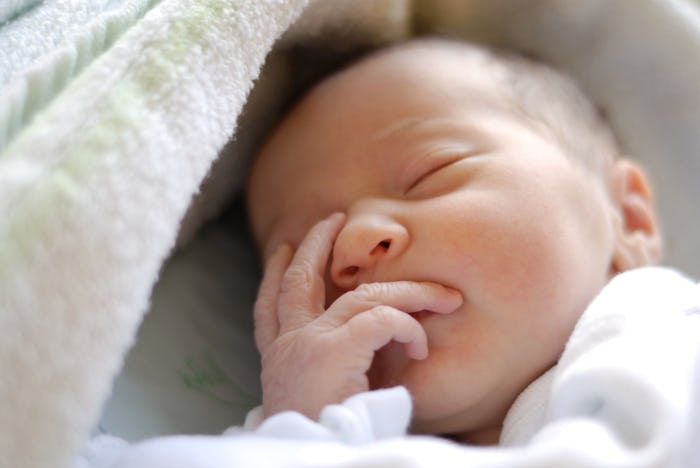New babies seem to have two jobs: to eat and to sleep. Sometimes they throw in a little crying just for fun. Comedian Steven Wright once joked that when looking for a baby gift, he wanted to give a shirt that read, "Still tired from the move." While there's something strangely entrancing about watching your baby sleep, it can feel like they are doing nothing else, and you might wonder why babies sleep so much and how much sleep is actually normal?
The National Sleep Foundation recommended that newborns get 14-17 hours of sleep a day, infants get 12-15 hours, and that toddlers clock in 11-14 hours of ZZZs a day. As more seasoned parents know, even within "normal" there is bound to be some variation, so don't compare your baby to your best friend's baby. Some are going to fall into that 14-17 hour parameter, some will sleep a little less and some even more. While 14-17 hours sounds like a lot, it can seem less so when your baby is sleeping in spurts and up several times a night... probably because they're hungry. (To give you an example, breastfed newborn may feed 10 to 12 times a day, according to KellyMom.)
If an adult needs eight hours of sleep, why is it that a new baby seems to need a whole lot more? Well, because it's their job. The most important thing they can do right now is grow and develop. The American Sleep Association (ASA) said, "A lot of sleep is important for newborns and is one of the most important things for growth and development." The ASA explained that this is crucial for their physical and psychological growth, and that the human growth hormone is released while they are sleeping.
It also may just feel like your baby is sleeping more if the bulk of their sleep is happening during the daytime. As Baby Center explained, newborns often have their days and nights mixed up, and much to parents' frustration, babies can be nocturnal. Kim West, known as "The Sleep Lady and author of the book, The Sleep Lady's Good Night, Sleep Tight, told Parents that newborns haven't yet established their own circadian rhythms of melatonin production. Melatonin is a hormone that regulates sleep-wake cycles.
As they get older this will develop, and you can also work to shift their schedules and hopefully reclaim a little of your own sleep. Deborah Lin-Dyken, a pediatric sleep disorder specialist, suggested to Baby Center that parents who want to shift their baby's sleep cycle should take steps that include establishing a wake up time and sticking to it, even if it means waking your baby. She also suggested waking your baby for feedings and creating dark environments for sleep time and more light-filled and music-filled environments when they should be awake. However, some professionals, like Dr. Marc Weissbluth, a pediatrician and author of Healthy Sleep Habits, Happy Child, don't feel you should wake a sleeping baby to eat and that evening feedings are usually temporary and will improve with time. You should choose what you are most comfortable with.
Here's one thing you should not do: Nemours' Kids Health website advised parents not to keep their babies awake during the day in hopes it'll have them sleep better at night. They said this could actually backfire and cause you to have an overtired baby, which might make it even harder for them to fall asleep at night.
As much as it seems like newborns sleep a ton, now you know that there is actually a lot happening while your baby is getting her ZZZs. And before you know it, they'll be on a sleep schedule that is more conducive to your lifestyle (i.e. sleep through the night in one long stretch). Until then, you have a new appreciation for the term "sleep like a baby."
Check out Romper's new video series, Bearing The Motherload, where disagreeing parents from different sides of an issue sit down with a mediator and talk about how to support (and not judge) each other’s parenting perspectives. New episodes air Mondays on Facebook.
